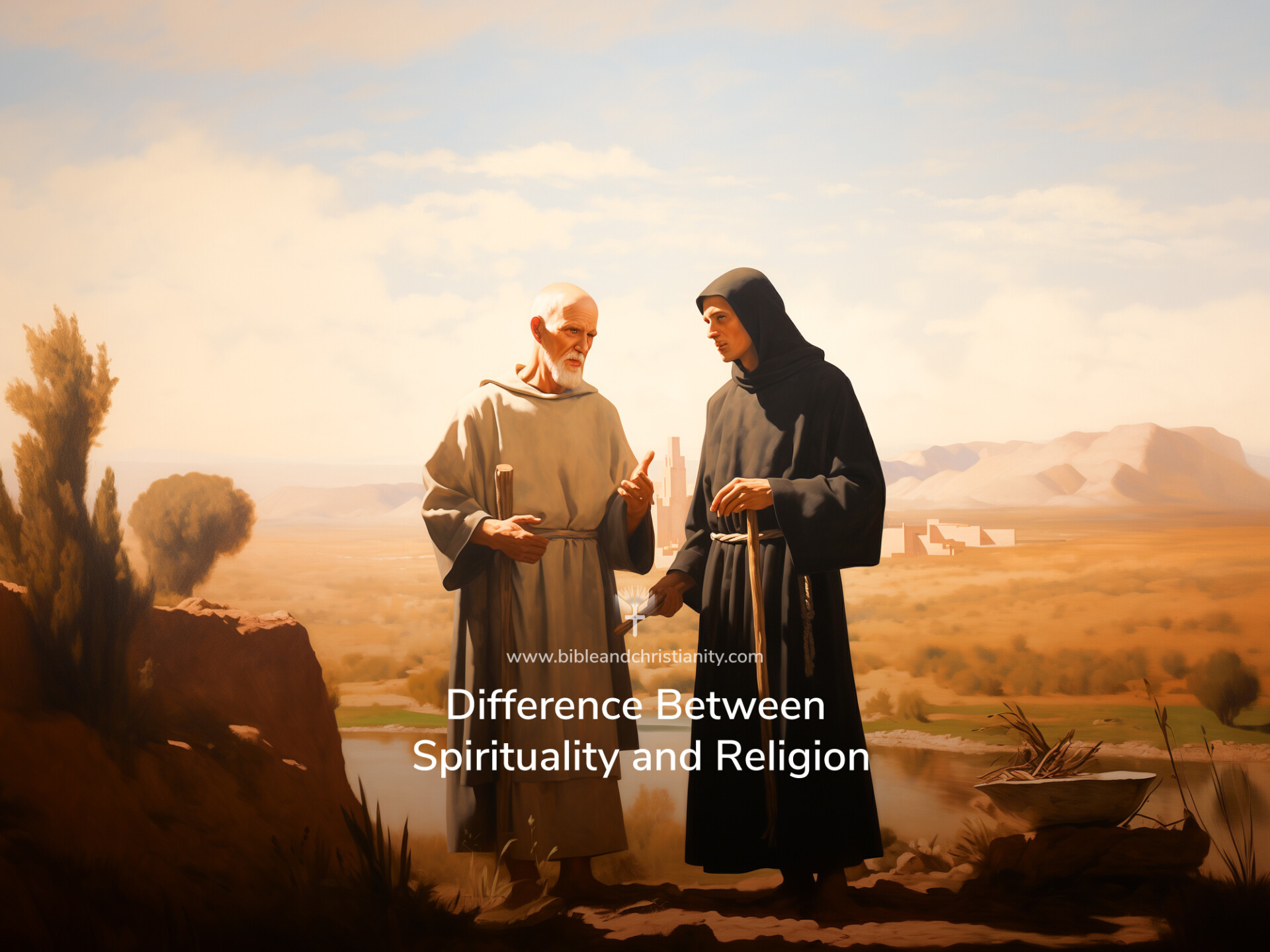What Is the Difference Between Religion and Spirituality?
Have you ever heard someone say, “I’m spiritual but not religious”? A growing number of Americans choose to identify with one over the other when describing their faith. Most people who believe in a higher power fall into both camps. Increasingly, however, people are drawn to the former while disassociating with the latter. Is there a difference between spirituality and religion?
There is, but it comes with some nuance. To understand the difference, let’s take a closer look at the many aspects involved, including dictionary definitions, cultural considerations, and ultimately, the Biblical perspective on religion and spirituality.
The Difference Between Religion and Spirituality
The difference between spirituality and religion is subtle but significant. Spirituality refers to philosophies and practices that explore the soul, higher powers, or the incorporeal.
Religion lends structure to those practices by defining what is sacred, determining who or what possesses higher powers, and establishing parameters for how people should engage with those entities. This is then reinforced by community guidelines for like-minded believers.
Religion and spirituality’s connection makes differentiating them so difficult. They coexist and are oftentimes interdependent. However, it’s possible to participate in one without the other. For instance, a spiritual person may shun religion in favor of pluralism (as with the “I’m spiritual but not religious” crowd), while another individual may participate in the ceremonies and rituals of organized religion but lack any spiritual connection to a higher power.
How the Dictionary Defines Religion and Spirituality
Merriam-Webster defines religion as “a personal set or institutionalized system of religious attitudes, beliefs, and practices; the service and worship of God or the supernatural; commitment or devotion to religious faith or observance; a cause, principle, or system of beliefs held to with ardor and faith.” Some key phrases that stand out in this definition are “institutionalized system,” “commitment or devotion,” and “beliefs held to with ardor.”
On the other hand, spirituality is defined as “something that in ecclesiastical [related to the church] law belongs to the church or to a cleric as such; clergy; sensitivity or attachment to religious values; the quality or state of being spiritual [of, relating to, consisting of, or affecting the spirit].”
According to Merriam-Webster, spirituality is a component of religion and belongs to the practitioners of the church (such as clerics and clergy). This aligns with a traditional understanding of spirituality. Society, however, is leaning toward the generic part of the definition: the quality or state of being spiritual or what affects the spirit.
In a pluralistic culture, many approaches to spirituality exist outside of the Christian perspective, for better or worse. The increasing prevalence of these perspectives requires us to take a closer look at culture’s influence on both concepts.
Cultural Approaches to Religion and Spirituality
Cultural context helps us understand concepts. Social influence gives words lives of their own, sometimes completely altering their definitions (forcing the dictionary to play catch up).
In a postmodern, pluralistic age, our approach to religion and spirituality is changing. Understanding this evolution lends insight into why people are drifting toward spirituality but away from religion.
Culture and Religion
According to the Pew Research Center, sixty percent of U.S. adults believe America was founded as a Christian nation, but only one-third of U.S. adults think it still is (and only 45% think it should be).
Fortunately, they do believe that religion positively impacts society, despite a majority preferring that religion stays out of politics. This isn’t surprising news. Historically, religion and politics rarely mingle to glorify God. They typically end in war and destruction.
In the past and present, religion was used as a basis for controlling and harming people. There are many examples that demonstrate the damage wrought by religious superiority: the Inquisition, the Crusades, indigenous genocide and subjugation, the Salem witch trials, Islamic persecution of Hindus, the Holocaust, and Islamophobia, to name a few.
As society embraces open-mindedness, there’s a temptation to throw out religion in the name of tolerance. But people don’t want to abandon faith altogether. That’s where spirituality comes in.
Culture and Spirituality
Modernized spirituality empowers people to pick and choose whatever spiritual philosophies and practices they prefer. Anything that connects to the soul or “the divine,” however interpreted, is fair game. Usually, emotions, euphoric experiences, and the senses guide this type of spirituality rather than religious texts. These guidelines and restrictions are cast aside to favor personal perception and opinion. What feels true becomes true.
Removing institutionalized parameters also smooths over the rifts caused by differing values and beliefs. In our highly individualized culture, that’s a very attractive premise. In effect, people can believe whatever works for them. As they say, “Live and let live. To each his own.” This perspective allows everyone to be included in spirituality without any commitment to personal transformation or improvement. Unfortunately, this has led to a rise in occult practices, the prevalence of witches, and paganism.
Is this what God desires for His people? While God wants everyone to be included in His plan for redemption, can we pick and choose what works best for us and call it spirituality? What does the Bible say about it all? Let’s find out.
What Does the Bible Say About Religion and Spirituality?
The Bible is the basis for Christianity and its spiritual practices. In 2 Timothy 3:16-17, Paul says, “Every Scripture is God-breathed and profitable for teaching, for reproof, for correction, and for instruction in righteousness, that each person who belongs to God may be complete, thoroughly equipped for every good work.” These guidelines are meant to govern our behavior and relationship with God (the higher power). That means Christian spirituality, or practices that connect us with God, are regulated by religious standards.
While there are different interpretations of God’s Word, Christians are generally united on the Bible as the primary source of truth. So, let’s look at the biblical perspective on religion and spirituality to discern God’s desire for our lives.
Biblical Religion
James 1:27 puts it plainly: “Pure religion and undefiled before our God and Father is this: to visit the fatherless and widows in their affliction, and to keep oneself unstained by the world.” In other words, service to God looks like caring for the suffering and forsaking sin.
James expounds on his point by emphasizing that faith without works is dead (James 2:14-17), while Paul reinforces that works done without love are meaningless to God (1 Corinthians 13). There is a chemistry between obeying God’s law (forsaking sin) and loving others (caring for the suffering).
When a lawyer asked Jesus to name the greatest commandment in Matthew 22, Jesus responded, “‘You shall love the Lord your God with all your heart, with all your soul, and with all your mind.’ This is the first and great commandment. A second likewise is this, ‘You shall love your neighbor as yourself.’ The whole law and the prophets depend on these two commandments” (37-40). Therefore, our religion also hangs on these two commandments.
Biblical religion teaches us how to live by God’s will and desire for our lives. So, where does that leave spirituality?
Biblical Spirituality
Biblical spirituality is to be born of the Spirit through Jesus. “The natural man does not receive the things of the Spirit of God,” says 1 Corinthians 2:14. Our natural, fallen desire is to rebel against God and serve our sinful nature. This nature must be replaced. To do that, we must accept Christ as our Savior and receive the Spirit, who then transforms us to become more like Christ.
This sanctifying process changes our thoughts and actions through the renewing of our minds (Romans 12:2). It’s an ongoing journey that requires active participation. Communing with God through prayer, Bible study, scriptural meditation, corporate worship, and service is not only born of the Spirit but feeds it as well. In this way, we become wholly reliant on God for all our needs, physical and spiritual.
Uniting Religion and Spirituality
Biblical religion is more than a moral code. Biblical spirituality is more than an emotional connection with a divine being. They are a unified approach to restoring us to God’s original plan: constant connection with Him.
Jesus was both religious and spiritual, demonstrating what it looks like to live in obedience to the law and in relationship with the Father. The Word was His guidepost, and it’s ours, too. Scripture is full of stories and commands that instruct us to live by God’s will.
There may be a difference between religion and spirituality, but for the Christian, they are an inseparable pair. When we practice them the way God intended, we learn more about His love. When we submit to their authority in our lives, we get a glimpse of the world to come. When we embrace their transformational power, we begin to look more like Christ, which pleases our Savior and shows the watching world who He truly is.

